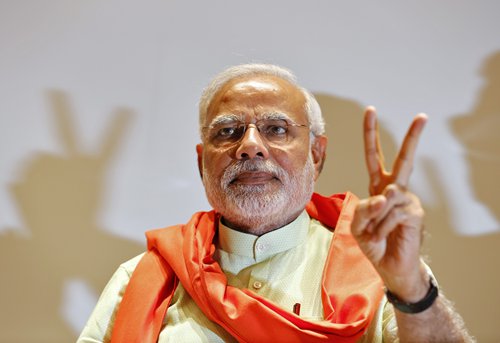HOME >> OPINION
Pros and cons of Modi as a strong politician
By Ding Gang Source:Global Times Published: 2019/5/29 17:13:40

Photo: VCG
Indian Prime Minister Narendra Modi's thumping victory on May 23 reflects the power of nationalism in an ascendant nation. Such a sentiment led voters to re-elect Modi and vest their future in him.
Modi's victory has come about more because of his image as a strong politician.
India badly needs a strongman politician. The country is anxious for rapid development. Indians are keen on realizing in short time the great dream - build India into a developed economy - they have had since independence from British suzerainty in 1947.
The Indian population is largely young. The number of Indians under the age of 35 accounts for more than 60 percent of the population. The majority of over 80 million new voters in the general election are young people who have just gained the right to vote.
These young people, who know more about modernization than their predecessors, are full of passion for modernizing India. The young people don't want to stagnate, but help bring about transformation, which is the repository of hope for India. They have deeply nurtured by nationalism, especially Hindu nationalism.
India does need a strong leader to break through some of the drawbacks that have percolated into the national fabric over the years, regardless of the interference of some interest groups, so that it can advance reforms that have been impossible to implement for years.
Meanwhile, as a strong prime minister, the 68-year old Modi will encounter another challenge in his next term over five years - how to improve India's relations with Pakistan.
The two problems are related to China. Economic opening-up and policy integration among all states will benefit economic and trade cooperation with China, especially when some Chinese enterprises are seeking opportunities to go global. Complex ties with Pakistan have always affected India's view on China, impeding cooperation in economy and trade. India has not participated in the China-proposed Belt and Road Initiative.
To a large extent, Modi's victory did not stem from the fact that he delivered the promises he made five years ago, especially the promise of development and providing more jobs, but because he was playing the security card during the election.
During the election, terrorist attacks occurred in Sri Lanka and New Zealand. More importantly, clashes in Kashmir between India and Pakistan made quite a few voters feel that only a strong and domineering leader like Modi can bring Indian people the sense of security.
Some foreign observers contend that Modi winning his second five-year term in office may become a rare opportunity for improving India-Pakistan relations. On May 26, Modi received a congratulatory phone call from Pakistani Prime Minister Imran Khan, the first telephone conversation between the two leaders since the air strikes in February. This is a good start.
However, incidents of hate crime have been seen after the election. And Indian people's hostility toward Pakistan can be sensed on the internet.
The strong leader that Modi is, he can of course rein in impulsive nationalism, further open up India's economy and improve ties with Pakistan. But his strength is closely linked to nationalism, populism and the revival of Hinduism. That being said, Modi's rule might turn out to be more nationalistic given the constraints of other powerful forces. It may hinder further opening-up and secularization, and deepen the sense of distrust and hostility between the people of India and Pakistan.
The author is a senior editor at People's Daily, and a senior fellow at the Chongyang Institute for Financial Studies of Renmin University of China. dinggang@globaltimes.com.cn. Follow him on Twitter @dinggangchina
Posted in: